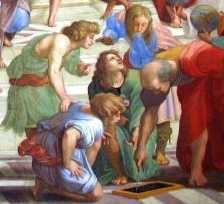This hymn comes from the Cathemerinon, which I have mentioned here in a previous blog post, where I told a little bit about the author Prudentius. This particular hymn comes from Chapter XII, Hymns for the Epiphany. I will include the English translation found in that first link, which is the Gutenberg e-book website version of that collection of hymns.
Quicúmque Christum quæritis,
All you, whoever seeks the Messiah
óculos in altum tóllite:
raise your eyes on high:
illic licébit vísere
in that place you will be permitted to see
signum perénnis glóriæ.
the sign of perennial glory.
Hæc stella, quæ solis rotam
This star, which defeats the wheel of the sun
vincit decóre ac lúmine,
in both beauty and in luminescence
venísse terris núntiat
announces to the earth He has come
cum carne terréstri Deum.
[clothed] with earthly flesh [yet who is] God.
En, Pérsici ex orbis sinu,
Lo, Persian Magi from the bosom of the world
sol unde sumit iánuam,
from the door where the sun rises [the East]
cernunt períti intérpretes
they discern as expert interpreters
regále vexíllum magi.
the regal flag, the royal banner.
«Quis iste tantus — ínquiunt —
"Who is this who is so great—the y ask---
regnátor astris ímperans,
a king who commnds the stars,
quem sic tremunt cæléstia,
before whom the heavens tremble,
cui lux et æthra insérviunt?
to whom the stars and planets are submissive?"
Illústre quiddam cérnimus
"Something brilliant we discern
quod nésciat finem pati,
which can know no limit,
sublíme, celsum, intérminum,
raised on high, lofty, without boundaries
antíquius cælo et chao.
more ancient than the sky, than primordial chaos!"
Hic ille rex est géntium
"This is He who is King of the nations
populíque rex Iudáici,
and King for the people of the Jews as well
promíssus Abrahæ patri
the One promised to Abraham the father
eiúsque in ævum sémini».
and to his seed for ages to come."
Iesu, tibi sit glória,
Jesus, to Thee be glory
qui te revélas géntibus,
Who doth reveal Thyself to the nations
cum Patre et almo Spíritu,
with the Father and the gentle Spirit,
in sempitérna sæcula. Amen.
unto uncountable ages.
Prudentius, died circa 405.
Lift up your eyes, whoe'er ye be
That fare the new-born Christ to see:
For yonder is the shining sign
Of grace perennial and divine.
What means this star, whose piercing rays
Outshine the sun's resplendent blaze?
'Tis token sure that God is come
In mortal flesh to make His home.
Lo! from the regions of the morn
Wherein the radiant sun is born,
The Persian sages see on high
God's ensign shining in the sky.
Who is this sovereign (they enquire)
That lords it o'er the ethereal choir?
'Fore whom the heavens bow down afraid,
Of all the worlds of light obeyed?
Sure 'tis the sign most reverend
Of Being that doth know no end:
Of One in state sublime arrayed
Ere sky and chaos yet were made.
This is the King of Israel,
Of all in Gentile lands that dwell:
The King to Abram and his seed
Throughout all ages erst decreed.
Translation by R. Martin Pope, 1905

No comments:
Post a Comment